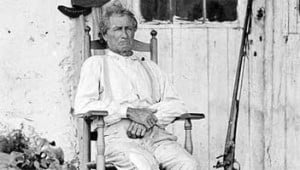A Few Appropriate Remarks
The thirty-two year old attorney for the state of Pennsylvania had been asked by Andrew Curtin, the governor of Pennsylvania, to purchase some ground, collect the dead from the battle of Gettysburg, and dedicate the whole at a special day in 1863. The first two assignments had been accomplished by David Wills. Seventeen acres were purchased for the National Cemetery. The fallen heroes of that great pivotal battle of Gettysburg had been collected for burial. And an early date in November had been set aside to dedicate the whole cemetery.
The main speaker was to be orator Edward Everett. He had a reputation in holding an audience’s attention. Battlefields always were his favorite choice for orations, having augmented the fame of Lexington and Concord and Bunker Hill. So he was chosen for this early date, except he begged off for an early November date, saying he had to write his speech and memorize it. So Everett chose November 19th at the earliest date he could be there. And it was agreed by Wills that this would the date for the dedication.
As a special courtesy, the young lawyer also wrote a letter to Abraham Lincoln, the President of the United States of America, asking him to make “a few appropriate remarks” after Edward Everett. To all students of history, you realize that no one remembers anything from the two hour address of over 13,000 words from Everett, but everyone remembers, and some have even memorized the two hundred and seventy words of President Lincoln, called the Gettysburg Address. It starts “Four score and seven years ago. . . .”
But our emphasis today is not on Edward Everett or even Abraham Lincoln, but on the young attorney who was responsible for planning and executing the Dedication Day on November 2, 1863. His name was David Wills. And he was a Presbyterian ruling elder!
Born in 1831, in Adams County, Pennsylvania, David stayed on his father’s farm until age 13 when he entered what is now Gettysburg College, graduating with high honors. He was admitted to the bar in 1854 and opened a law office in Gettysburg. Two years later, he married Catherine Jane Smyser, fathering seven children by her.
His home was prominent on the main diamond of Gettysburg, and it was at this home that Abraham Lincoln stayed the night before his memorable address on the 19th of November. In fact, he wrote the final draft of that famous speech at Will’s home. The house is now a museum in Gettysburg.
David Wills was a member and ruling elder of the Presbyterian Church of Gettysburg. Later in his life, he would represent the church and denomination at regional and national Reformed conferences. He went to be with the Lord in 1894.
Words to Live By:
In 1 Timothy 5:17, the apostle Paul wrote, “The elders who rule well are to be considered worthy of double honor, especially those who work hard at preaching and teaching.” (NASB) This is the text that Presbyterians use to distinguish between teaching elders (or ministers) and ruling elders. The church makes much of the the teaching elder, and well should we, for there is nothing better than faithful and godly ministers of the Word. But the ruling elder is to be respected and honored and prayed for as well, as he watches over the spiritual welfare of the flock of God (Hebrews 13:17).


